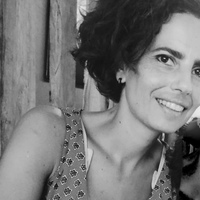
Marta Lança
Lisbon (1976). Phd student on Artistic Studies at FCSH - University Nova de Lisboa where she holds a post graduation degree in Portuguese Literature. She has been working as journalist, translator, editor and producer. She was professor Fernando Gil’s assistant and organized two summits: “The Process of Believe” and “New Robotics” (Gulbenkian, 2003). Having widely written for the Portuguese mainstream press (Público, Diário de Notícias, Le Monde Diplomatique, LER), Lança was chief-editor of V-Ludo cultural magazine (2000-01). These editing experiences lead her to Cape Verde, where she launched cultural magazine Dá Fala, support by Gulbenkian and IPAD (2004). From that period on, Lança’s focus has turned into contemporary culture in African Portuguese-speaking countries. She lived in Luanda for three years where, besides working as a journalist and teaching Literature at Agostinho Neto University, she collaborated with Luanda Triennalel (running an art gallery) and worked as a producer at Luanda Film Festival. In 2009,, she worked at DOCKANEMA, Maputo’s Documentary film festival. She has worked as reasearcher and producer in film documentaries.
less
Uploads
Papers by Marta Lança
I feel more comfortable not having definitions. I think these definitions have a lot to do with the academia, and I am not a scholar. At a certain point, I had to interrupt my studies and go into the workforce, but I already had this artistic calling since my childhood. I always felt that art was something inherent within me. In my professional life I learned to use tools, to practice and absorb more knowledge; with experimentation I became more and more the artist that I am. I have always felt this way. It’s the sum of everything I’ve absorbed, from the moment when I realized that art was my path.
This is a city of hard times, but also of encounters and possibilities with which he has grown up. In this text, we are led by the memories of Dj Lucky, between various sound tracks of quisange, semba, and afro blues, and multiple tracks on the floor, from Kinshasa to the Graça neighborhood, passing through Luanda, Cova da Moura, and Bairro Alto.
Tchiloli has been practised in São Tomé and Príncipe for a long time, but has suffered relative decline in recent years. At the basis of tchiloli is the representation of Madeiran poet Baltazar Dias’ version of The Tragedy of the Marquis of Mantua and the Emperor Charlemagne (1664), usually on the island of São Tomé, and of Auto de Floripes, on Saint Lawrence’s Day (15/8), on the island of Príncipe. Tchiloli is inspired by Castilian novels, which in turn had benefited from influences dating back to the Carolingian cycle of the 11th century. The story is about Don Carloto, son and heir of the Emperor Charlemagne, who murdered his best friend, Valdevinos, nephew of the Marquis of Mantua, in a hunt. This passionate crime (motivated by Don Carloto’s passion for Sibyl, Valdevinos’ wife) led the two families to debate issues of law, justice and governance. The emperor was faced with the dilemma of choosing between national interest and paternal love, and his son was executed in the imperial fortress in the end. Translation: Kaian Lam
Vazantes, 2019Michelle Sales
Michelle Sales
Esta conversa é motivada pelo desejo de pensar um espaço de troca entre Brasil, Portugal e África tendo em conta os desdobramentos, contradições e críticas do pensamento pós-colonial. Transitando livremente entre o cinema, artes visuais e plataformas discursivas, tentamos vislumbrar os tópicos de agitação no campo das artes e do debate público em nome de formas emancipatórias, contra práticas e simbologias de matriz colonial.